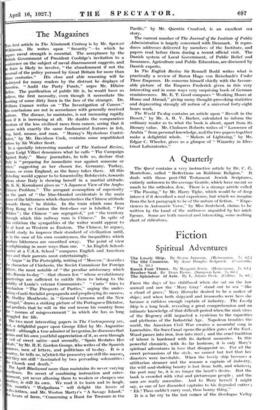The Magazines
d
s.
e
a
I I
'tr. first article in The Nineteenth Century is by Mr. Spenser ilkinson. He writes upon " Security "—to which he roes naval strength is essential. The acceptance by the ritish Government of President Coolidge's invitation to a inference on the subject of naval disarmament suggests, and e fears is likely to involve, " the abandonment if not the
renal of the policy pursued by Great Britain for more than hree centuries.", His close and able reasoning will be troyed for many readers by the distrust he displays of " Audit the Party Funds," urges Mr. Hilaire
Hoc. The purification of public life is, he would have us lieve, the first necessity, even though it necessitate the
ashing of some dirty linen in the face of the stranger. Dr.
Villiam Cramer writes on " The Investigation of Cancer." is conclusions are not in accordance with generally received otions. The disease, he maintains, is not increasing rapidly yen if it is increasing at all. He dqubts the comparative oat of the leas civilized races from cancer, seeing that it urs with exactly the same fundamental features in fish, g, bird, mouse, and man. " Murray's Mysterious Contri- utor," by Mr. Davidson Cook, contains some unpublished tters by Sir Walter Scott.
In a specially interesting number of The National Review, ignor Luigi Villari denounces what he calls " The Campaign
inst Italy." Many journalists, he tells us, declare that taly is " preparing for immediate war against someone or ther," suggesting as her chosen foe, Germany, Turkey, ranee. or even England, as the fancy takes them. All this I-feeling would appear to be fomented by Bolshevists, towards tom alone Italy is showing herself in a martial attitude. Ir. K. K. Kthvakami gives us "A Japanese View of the Anglo- hinese Problem." The arrogant assumption of superiority n the part of " the blue-blooded occidentals is the main
use of the bitterness which characterizes the Chinese attitude awards them," he thinks. In the train which runs from long Kong to Canton the first-class car is labelled, " For Mites ".; the Chinese " are segregated," yet " the territory 'augh which this railway runs is Chinese." In spite of his criticism the sympathies of the writer would appear to e at least as Western as Eastein. The Chinese, lie argues,
mild study to improve their standard of civilization until, s in the case of his own countrymen, the inequalities which roduce bitterness arc smoothed away. The point of view enlightening in more ways than one. " An English School- laster at a U.S.A. School " compares English and American and their parents most entertainingly.
" Augur " in The Fortnightly, writing of '` Moscow," describes he character of Chicherin, the Soviet Commissar for Foreign fairs, the most notable of " the peculiar aristocracy which les Russia to-day "—that chosen few " whose revolutionary uarterings are sufficient to entitle them to belong to the ability of Lenin's veteran Communists." " Curio " tries to reshadow " The Prospects of Parties," urging the under- king of anti-Socialist propaganda and prophesying its success. Ir. Dudley Heathcote, in General Carmona and the New "1111Hal," draws a striking picture of the Portuguese Dictator,
d predicts that he will in the end rescue his country from morass of misgovernment " in which she has so long !niggled for life.
The two most interesting papers in The Contemporary are, IA a delightful paper upon George Eliot by Mr. Augustine irrell—although a true admirer of her genius, he discusses that nius and his own youthful appreciation of it, as seen through veil of sweet satire—and secondly, "Spain Restates Her deals," by Mr. R. E. Gordon George, who writes of the Spanish inters, men of letters, and politicians of to-day. It is a antry, he tells us; in which the peasantry are still the masses, '14 they are still " fascinated by two pervading solemnities : e Church and death." The April Blackwood more than maintains its never varying cellence. Its secret of combining instruction and enter- unnent, yet never allowing them to weaken or cheapen one nether, is still its own. We read it to learn and to laugh. Ii s month's " Walpoliana " will delight the lovers of dies-lettres, and Mr. Weston Martyr's " A Savage Island," to lovers of farce. "Concerning a Hunt for Treasure in the
Pacific," by Mr. Quentin Cranford, is an excellent sea story.
The current number of The Journal of the Institute of Public Administration is largely concerned with Denmark. It repro- duces addresses delivered by members of the Institute, and papers read before them during a recent official visit. The Danish system of Local Government, of Public Relief and Insurance, Agriculture and Public Education, are discussed by Danish experts.
In The English Review Sir Rennell Rodd writes what is practically a review of Baron Hugo von Reischach's Under Three Emperors. He concerns himself chiefly with the favour- able picture of the Empress Frederick given in this very interesting and in some ways very surprising book of German reminiscences. Mr. E. T. Good compares " Working Hours at Home and Abroad," giving many thought-provoking statistics and deprecating strongly all notion of a universal forty-eight hours week.
The World To-day contains an article upon " Revolt in the Desert," by Mr. A. R. V. Barker, calculated to inform the ordinary reader as to what the book is about, apart from its literary value. Mr. Chalmers Roberts writes of " Lawrence of Arabia " from personal knowledge, and the two papers together make a delightful whole. " Makers of Lightning," by Mr. Edgar C. Wheeler, gives us a glimpse of " Wizardry in Elec- trical Laboratories."


































 Previous page
Previous page